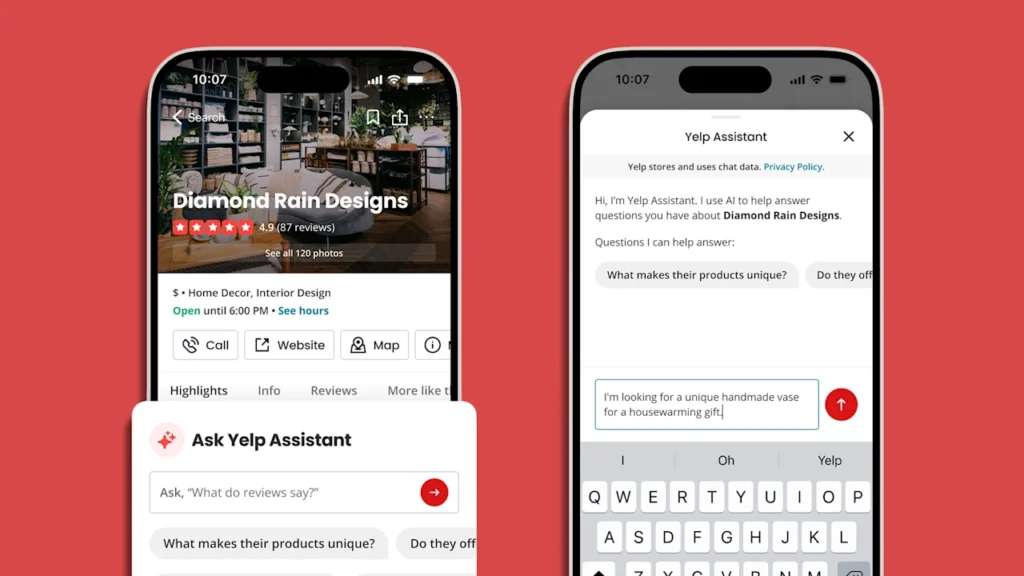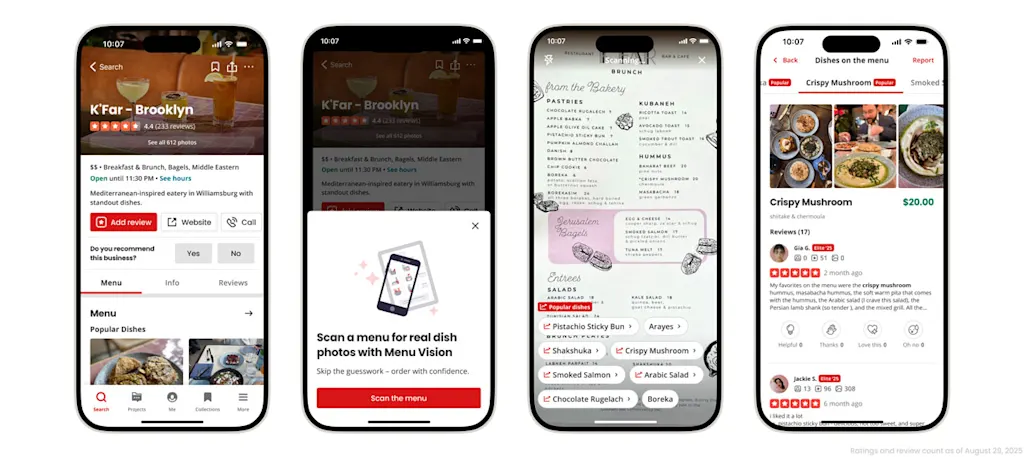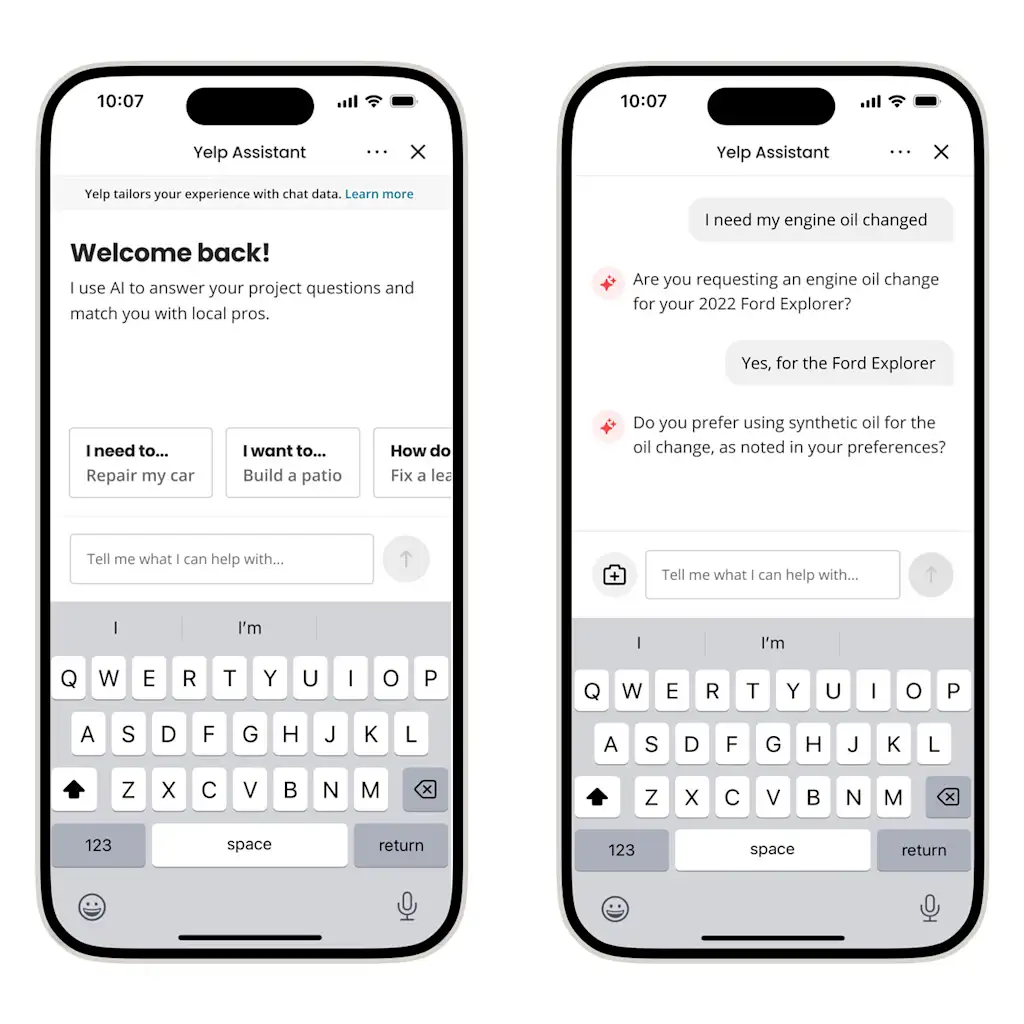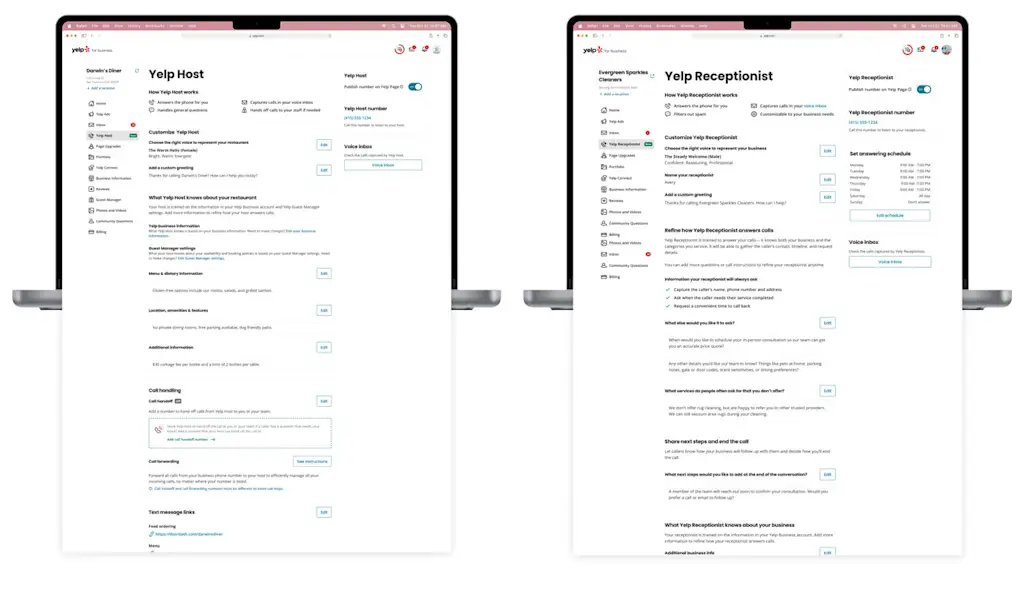
Yelp users looking to learn more about restaurants, businesses, and other locations on the platform can now get information from an AI-powered Yelp Assistant.
When logged-in users on Yelp’s iOS and Android apps visit particular business pages, they can now ask specific questions ranging from where to park to whether a restaurant offers vegan options. The answers are generated based on facts from reviews posted on Yelp, information provided to the platform by businesses, and businesses’ own websites, with relevant sections and even photos from Yelp reviews highlighted in the AI response.
The assistant also provides a list of suggested questions to ask about a particular business. In addition, a new AI-powered feature called Popular Offerings separately highlights goods and services frequently mentioned and photographed in a business’s Yelp reviews.

In a demonstration for Fast Company, Akhil Kuduvalli Ramesh, Yelp senior vice president of product, highlighted how the Yelp Assistant could answer questions about a restaurant’s cuisine, parking, dog-friendly seating, and even the best times to avoid a long wait. The AI surfaced information from reviews and even user-submitted photos of canine-compatible outdoor tables.
“This isn’t an AI that’s hallucinating,” says Kuduvalli Ramesh. “This is an AI that is providing me answers, evidence first.”
Tapping into a rich vein of content
The expansion of the Yelp Assistant, which launched last year with a focus on helping consumers find services from home repair to haircuts, comes as other tech companies from longtime rival Google to startups like Perplexity promote AI options for finding and booking tables at local restaurants, which has long been a key part of Yelp’s mission. But Yelp cofounder and CEO Jeremy Stoppelman says the company’s wealth of business data, long trusted by consumers and partner services like Apple Maps, enables it to deliver reliable answers in an age of hallucinating AI.
“We’re now at the point where you will be able to ask detailed questions about nearly every business on Yelp,” he says. “And it’s able to tap into the rich content, the reviews, and all of the survey information—everything that we’ve been able to gather about that business.”
Stoppelman anticipates the Yelp Assistant will continue to grow more powerful, able to offer more detailed, personalized recommendations across businesses and categories. Already, thanks to Yelp’s AI advances, users can also now type or speak more involved natural language queries into Yelp’s search interface, with the AI able to parse requests like “need help fixing a leaking faucet” or “dog-friendly brunch spot that’s good for groups” instead of simply matching on keywords.
“We would like people to basically query Yelp as though they’re talking to it,” says Kuduvalli Ramesh.

And when Yelp users visit a particular restaurant, they can also now use the service to quickly find information about particular dishes by using the Yelp app to scan the menu with a new feature called Menu Vision. It can offer quick links to reviews and photos of Yelp-reviewed dishes, and the company plans to continue to expand the feature to include more options and information over time.
Growing competition
Yelp’s push into AI is far from the first time the company has incorporated new technology to meet new consumer tastes. In the heyday of Foursquare, Yelp added location check-in features. And as TikTok and other video platforms became increasingly important tools for restaurant discovery, Yelp enabled users to post short-form videos alongside text reviews and photos.
The company, which for its most recent quarter reported $44 million net income on a record net revenue of $370 million, has also expanded into home services in recent years, taking on rivals like Angi and Thumbtack with its increasingly sophisticated tools to request quotes and communicate with home professionals. And in November 2024, Yelp also acquired RepairPal, which connects users with auto repair shops, and has been integrating its offerings into the core Yelp product.

Yelp’s AI also now offers guidance to service professionals on responding to customer requests—and awards visible badges to those with a pattern of helpful responses. A pair of paid AI phone tools, called Yelp Host and Yelp Receptionist, are now also rolling out to restaurants and other businesses, respectively, to field calls from customers. Yelp Host is able to book and modify reservations, including fielding special requests, while Yelp Receptionist can capture contact info and full call transcripts, then summarize the relevant information needed to get back to a potential customer.
“By the time the local business gets a lead, it’s a fully vetted lead, and it’s got an AI summary,” says Craig Saldanha, Yelp’s chief product officer. “They can listen to the transcript, but they can also read the summary in 30 seconds and essentially call you back with all of the information.”
Yelp Host and Receptionist are designed to let busy restaurants and businesses actually process phone calls, rather than simply amassing voicemails, while they’re closed for the day or assisting other customers. And those services, too, are enabled by the detailed information Yelp has amassed over more than two decades about specific businesses and different types of local merchants, Stoppelman says.
“It is grounded in the same underlying infrastructure,” he says. “And so, when you do sign up, we have a very good understanding of businesses, both in that category and then your business specifically.”


